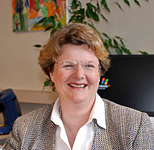Koninklijke Onderscheiding voor Petra Rudolf

Vrijdag 26 april 2013 ontvangt mw. prof.dr. P. Rudolf op voordracht van de Rijksuniversiteit Groningen een Koninklijke Onderscheiding. Ze wordt benoemd tot Officier in de Orde van Oranje Nassau.
Burgemeester dhr. dr. J.P. Rehwinkel van de gemeente Groningen decoreert mw. prof.dr. P. Rudolf om 9.30 uur in het Stadhuis op de Grote Markt in Groningen.
Mw. prof.dr. P. Rudolf
Mw. prof.dr. P. (Petra) Rudolf (München, 1957) is sinds maart 2003 hoogleraar Experimentele vaste stof fysica bij het Zernike Institute for Advanced Materials van de Rijksuniversiteit Groningen. Ze is hoofd van de Groep Oppervlakken en Dunne Lagen.
Het onderzoek van Rudolf richt zich op bijzondere vormen van koolstof en hun wisselwerking met metalen, met daarnaast haar spectaculaire werk met elektronica en machines op moleculaire schaal. Hiervoor werd Rudolf met haar onderzoeksgroep één van de winnaars van de Descartes-prijs - de belangrijkste onderzoeksprijs van de Europese Unie - voor hun aandeel in het SynNanoMotor-consortium, een samenwerkingsverband met onder meer onderzoekers uit Frankrijk, Italië en Schotland. Samen bouwden de onderzoeksteams een van ’s werelds eerste kunstmatige nanomachines (in de orde van grootte van één miljoenste millimeter) en een kunstmatige moleculaire motor die sterk genoeg is om een minuscule vloeistofdruppel iets meer dan een millimeter te verplaatsen, zelfs tegen een helling van 12 graden. Het gevonden principe heeft veel toepassingsmogelijkheden. Door de buisjes van piepkleine analyseapparatuur kunnen bijvoorbeeld uiterst kleine hoeveelheden vloeistof gepompt worden met behulp van moleculaire motorsystemen. Vooral in de gezondheidszorg bestaat hiervoor grote belangstelling, bijvoorbeeld voor het lokaal behandelen van tumorcellen. Als eerste vrouwelijke fysicus in Nederland is zij op grond van haar excellente onderzoek uitverkoren tot Fellow van de American Physical Society. Dit is een eer die alleen de meest eminente natuurkundigen ten deel valt.
Naast dit alles bekleedt Rudolf tal van bestuurlijke posities. Zo was ze voorzitter van het Bestuur van het Zernike Institute for Advanced Materials, dat in deze periode mede door haar inspanningen enkele malen als top-onderzoekschool hererkend werd en is ze lid van de Universitaire Commissie voor de Wetenschapsbeoefening van de RUG. Ook is ze lid van de Raad van Bestuur van FOM, de nationale stichting voor Fundamenteel Onderzoek der Materie (samen met NWO de belangrijkste subsidiegevende organisatie op het gebied van de Natuurkunde in Nederland). Verder was en is ze lid/voorzitter van talrijke (inter)nationale jury’s en panels voor het toekennen van wetenschappelijke subsidies.
Rudolf is niet alleen wereldwijd erkend om haar grote hoeveelheid leidend en origineel onderzoek maar zeer zeker ook om haar niet aflatende inspanningen om vrouwen in de fysica te promoten. Zo is ze voorzitter van het FOM/v, waar ze zich met veel toewijding en enthousiasme inzet voor het stimuleren van vrouwen voor een loopbaan in de fysica en het behouden van vrouwelijk talent. De commissie kent onder andere de tweejaarlijkse Minerva Prijs toe, voor de beste wetenschappelijke publicatie geschreven door een vrouwelijke natuurkundige in Nederland. Wanneer ze uitgenodigd wordt om een wetenschappelijke lezing te geven biedt zij ook altijd aan daarnaast een lezing te geven over “Vrouwen in de Fysica, waarom zo weinig?” of “Vrouwen in de Fysica van de Middeleeuwen tot het eind van de 19de eeuw”. Ze is betrokken geweest bij cursussen voor vrouwelijke promovendi en bij NIMF, het Nederlandse netwerk voor vrouwen werkzaam in de informatica, wiskunde, natuurkunde en verwante vakken. Ook organiseert ze een maandelijkse lunch voor alle vrouwelijke natuurkundigen werkzaam bij de RUG. Ze is nu steun en toeverlaat, informeel of formeel als mentor, van nagenoeg alle jonge vrouwelijke wetenschappers in haar werkomgeving. Verder heeft ze de RUG kunnen overtuigen van het nut om een speciaal Kinderopvangprogramma op te zetten dat zich richt op ad hoc situaties (een ziek kind, reizen naar conferenties, deelname van ouders aan internationale projecten), waardoor het voor veel vrouwen makkelijker wordt om te reizen teneinde hun carrière verder te ontwikkelen en competitief te zijn.
Rudolfs inspanningen om de natuurkunde beter bekend te maken bij een breed publiek, in het bijzonder bij scholieren, zijn eveneens buitengewoon veelomvattend. Zo is zij bestuurslid van het Koninklijk Natuurkundig Genootschap Groningen dat ten doel heeft de belangstelling voor de kennis der natuurwetenschappen in ruime kring te bevorderen, door voordrachten en andere instructieve bijeenkomsten te organiseren en de uitgave van geschriften over natuurwetenschappelijke onderwerpen te bevorderen, vanwege het maatschappelijk belang. Sinds 2008 is ze voorzitter van het bestuur van de Stichting Nationale Natuurkunde Olympiade. Deze stichting heeft tot doel het organiseren van de jaarlijkse Nationale Natuurkunde-Olympiade in Nederland voor scholieren, alsmede de selectie, uitzending en training van de Nederlandse deelnemers aan de Internationale Natuurkunde Olympiade. Elk jaar worden er drie regionale en één nationaal Techniek Toernooi georganiseerd voor duizenden leerlingen uit het basisonderwijs. Dit is voortgekomen uit de activiteiten die in het jaar van de natuurkunde georganiseerd werden. Vanaf het begin van de regionale toernooien heeft ze daaraan haar medewerking verleend als jurylid. Jureren is in haar beleving niet alleen een kwestie van beoordelen, maar ook een manier om leerlingen aan te moedigen zich verder te interesseren in de natuurwetenschappen.
Petra Rudolf wordt benoemd tot Officier in de Orde van Oranje Nassau.
Noot voor de pers
Nadere informatie via de afdeling Communicatie van de RUG, tel. (050)363 4444, e-mail: communicatie rug.nl
Meer nieuws
-
17 februari 2026
De lange zoektocht naar nieuwe fysica
-
10 februari 2026
Waarom slechts een klein aantal planeten geschikt is voor leven
